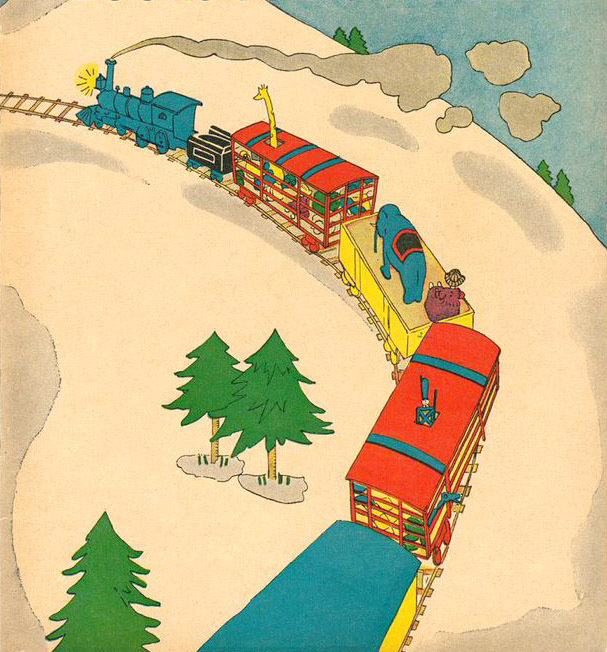Category Archives: Meanderings
Brief comments, quotes or things I want to remember or share.
The Desert Touches My Heart
Nature slams up against my mind and says, “see me!” Everywhere we stop and look, the wonder is palpable and often I want to say, “stop, no more.” But it doesn’t abate. God speaks through the wind and the distance mountains, the miniature flowers in the dry and unforgiving land.
On Wednesday, we went to the Petrified Forest. I hadn’t known what to expect; I didn’t preview that world; I just showed up. I learned that there had been a true forest there, millions of years ago, before T-Rex. What? How could that be? And those trees that collapsed for whatever reason, landed in waters filled with silica that eventually replaced the organic matter. As the landscape changed again, those stony trees began to come to the surface, but brittle, and many broke into chunks like sliced carrots or chalk. We only see the remains today. Mysterious and beautiful, the petrified tree pieces lie about. And all I could wonder: did those trees, that once breathed and spoke to one another through their underground network of roots, are they silent now? Is it just a graveyard? I really don’t know. Oh, trees of the world, tell me.
In the distance, the painted desert showed its colors, muted yet wondrous all the same. I didn’t know… again, that the painted desert was great hillocks of pointed rock showing layers of life.
There were human touches along the way, like the Painted Desert Inn, long ago built for the pleasure of tourists, bedraggled and then renovated again. A throwback. Inside was a jukebox and the original soda counter with a menu touting ice cream for ten cents. The wood furniture was made by the young men of the Civil Conservation Corps. The views from every window of the desert colors.
From there, we drove to Gallup, New Mexico for an authentic Mediterranean meal (go figure) and then a quick trip to the historic El Rancho Hotel for a cocktail. Lights out early in preparation for our drive to Santa Fe.
Every one of our drives has been about three to four hours and filled with the changing vistas of the desert. I thought I would be ready for a day in the city, but in the end, my heart was being called back to nature. We did manage a quick visit to the Basilica of St. Francis and the Loretto Chapel, with its mysterious spiral staircase. For many, this staircase is such a wonder, that it has been deemed a miracle, and several tourists prostrated before it, rosaries in hand. Our last stop was the Governor’s Palace and then off to La Choza restaurant (recommended by locals).
Here’s the thing about this place – the wait was over an hour, but the drinks were quite good and the food even better. If only we hadn’t had the nippy weather. Why did I bring so many summer clothes?
What will Friday bring?
Grand, Grander, Grandest
When Kathy said she had never seen the Grand Canyon, we three college friends knew we had to include this extraordinary place in our whirlwind road trip. I know, I know. In many ways, the “in-person” Grand Canyon doesn’t quite compare to the many postcards available at the gift shop or the coffee table books full of first class photography gathering dust. I agree, those professional photos are far better than what we could actually see on a blustery, hazy day.
And yet, there is something that happened in my heart as I stood on the south rim. Framed by bare limbs and pine trees, the ribbons of rock spoke—history, geology, eternity. A part of me wished I could simply sit down and contemplate the view, but we kept moving and walking and snapping quick pix. They would never tell the true story.
Later, after dinner, we squeezed in a 45 minute IMAX movie called Grand Canyon: Rivers of Time, just newly out in 2022. Fabulous. My heart soared as I watched the movie and realized it was a little like the feeling I had, standing alone at Lookout Studio. God is in this place.
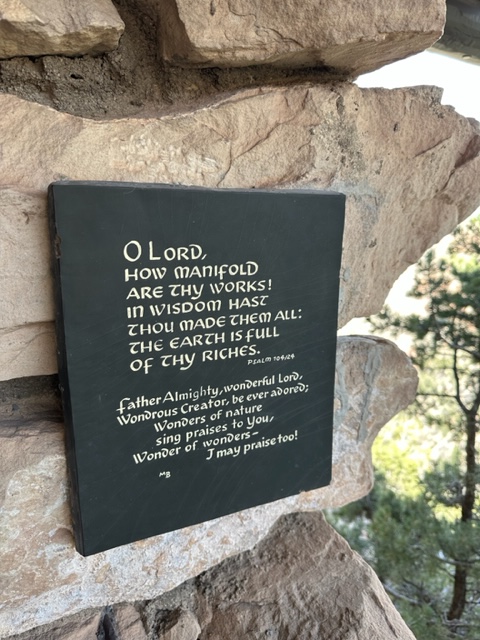
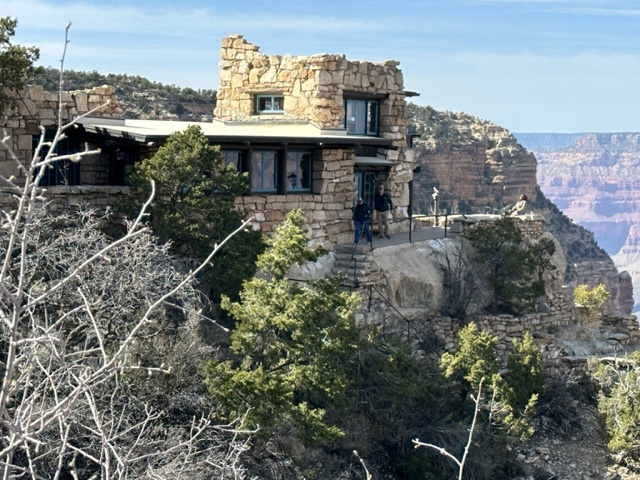
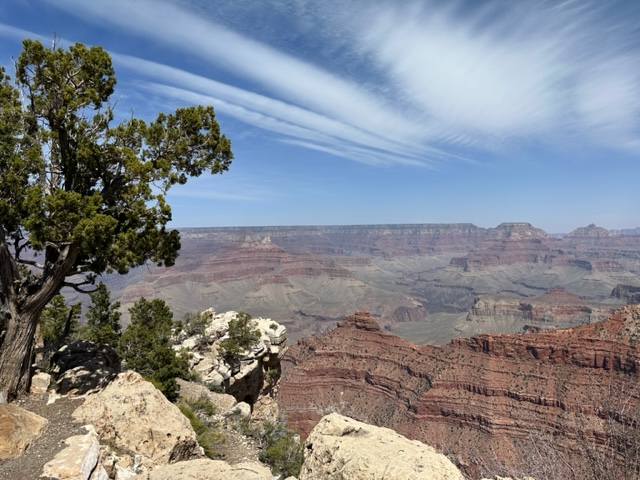
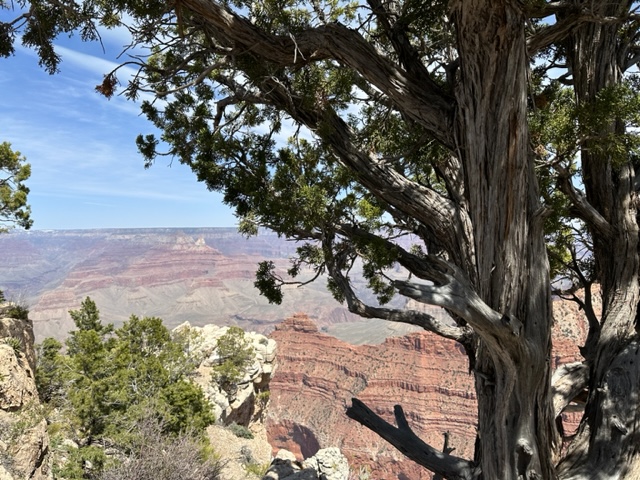
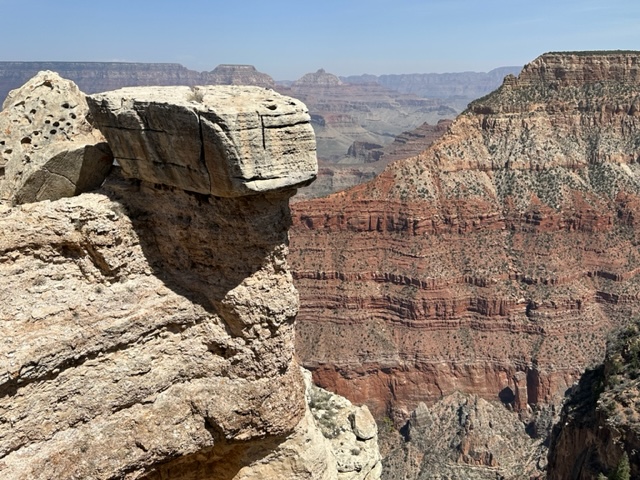
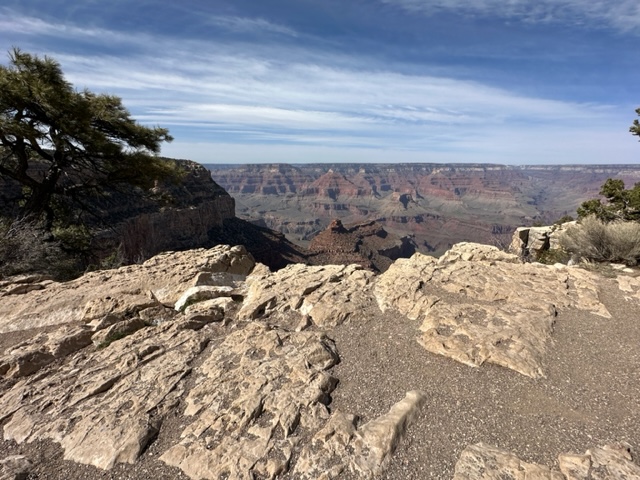
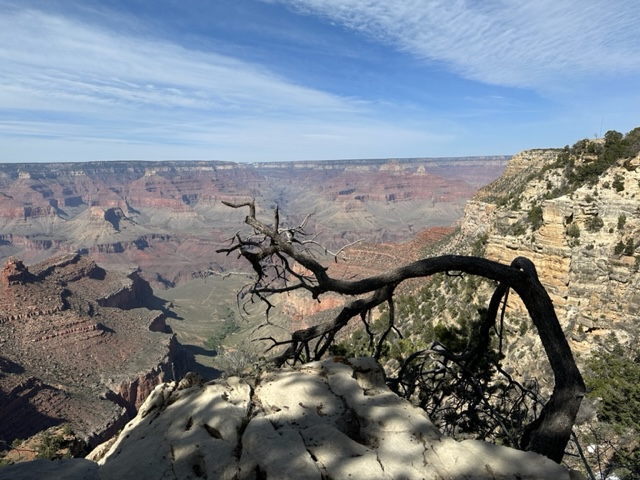
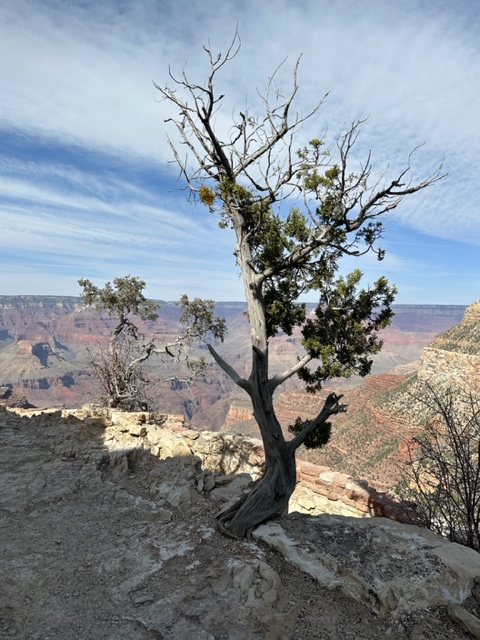
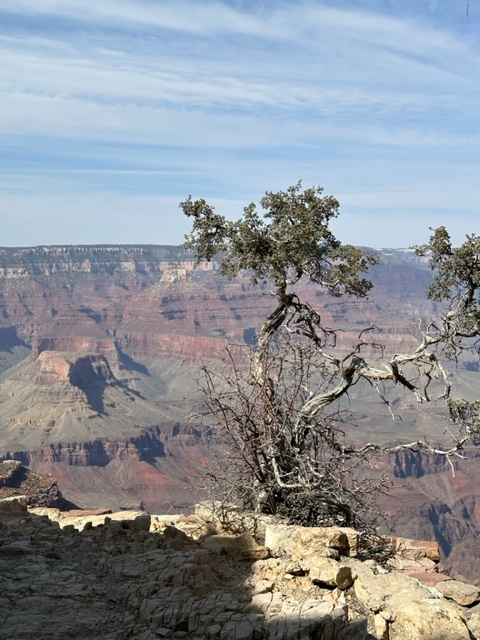
Embarrassed By My Unknowing
This morning I woke early, what with the time change from Eastern Standard Time to Mountain Time. I thought it would be a good time to review our day yesterday and look forward to the adventures of today. Our next door motel guests must also be from out east as they have been up long before me, the one whistling while taking a shower.
The motel is hysterical, the Canyon 66 “Ramada Wyndham” with its array of movie star murals and “Get Your Kicks from Route 66”. That’s right, we’ve landed for the night in Kingman, Arizona after a quick visit to the Hoover Dam. I’m guessing this is an old motel that was bought out by the Ramada people, but the only things that speak Ramada are the paper coffee cups and packets of whitener in the bathroom.
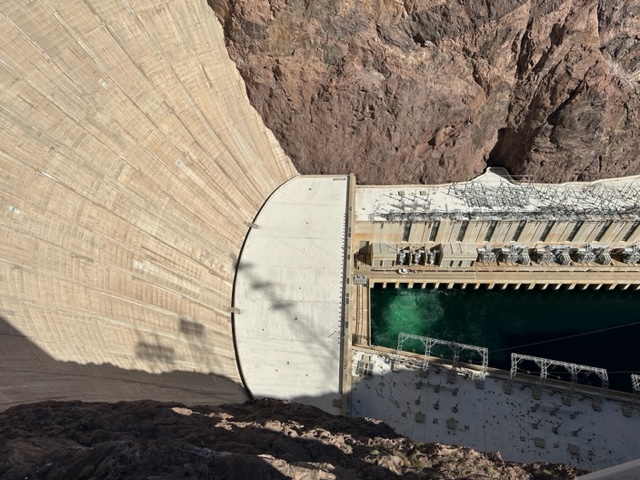
This is my second visit to Hoover Dam, the first being over 40 years ago. Since then, the Bureau of Reclamation has done a pretty nice job in the Visitors’ Center with historic displays and a 10-minute movie that highlights the accomplishments but skirts the water issues of the day. Along the rock walls of the Lake Mead side, we can see the once highwater mark from 1983, but today, the guide confessed, the lake is at its lowest point since the building of the dam in 1936. That’s sobering. But the tour through the turbines and the tunnels was fascinating and awe-inspiring. I recommend everyone take the time to visit.
But my lack of knowledge abounds as I look at the desert landscape. I ask my Southwest friends to forgive me for dullness of mind that became apparent when I tried to google the name of the lovely little purple and yellow flowers blooming along the side of the road (Highway 93). I thought it was an easy search only to discover that a myriad of yellow and purple flowers bloom in the desert. Duh! More than likely, the purple ones are Sand Verbena, but the yellow could be Desert Dandelions or Desert Marigold or Brittlebush.
I have no understanding or appreciation of the desert and really, I need to change that. I doubt this trip will do much more than make a dent into my blank slate. Naturally, I’ll take some pictures and do more investigating when I get home, but one thing I can do is really look. It’s hard on a road trip to make a lot of stops, otherwise, we won’t make the next point on the map. I make this small promise to myself, when we do stop, I’ll look in the distance, of course, but I’ll also look down, near my feet and perhaps a few wonders will be revealed.
The Last Shall Be First
I’ve had quite a pattern of “lasts” that have informed far too many of my bad choices along the way. As a young person, the idea of being last felt like major failure. In my family, “failure was not an option.” The joke? Most of my last places were in the top tiers. That’s right. I was the last of the best as opposed to dead last. And yet, it felt the same to me. Last was last and first was good, better, best.
My first example of this phenomenon is in third grade. Back in the late fifties, “exceptional” children did not attend classes in the same school as the regular kids. Instead, like today’s magnet programs, there were designated schools for a wide variety of special classes.
My brother was the first in our little inner city school to be offered an opportunity to attend one of these schools for high performing, high IQ students. He tested very well and upon entering the 4th grade, he rode public transportation to a school that offered gifted and talented classes through 8th grade. When I came up to grade, my mother wanted the same program for me. But unlike my brother, I struggled with the testing and I remember how the proctor told my mother, in my presence, “she’s borderline and if you send her to this program, she will be at the bottom of the barrel.” Lovely.
From that point on, I was on the lookout for more rock bottom experiences.
No surprise, then, when I would be the last one picked for kick ball or the last one in line for lunch. I was the last to understand the math and the last to get the joke.
I played a clarinet in that special school. Last chair. Later, I was accepted into all-city band. Of course, last chair again.
In high school, my mother insisted I take German instead of French or Spanish. And, as a result, I had the opportunity to compete for a statewide AFS summer experience in Germany between by Junior and Senior years. Only thirty students from the state were invited. What an honor. Of course, upon being accepted into the program, I was told I was at the bottom of the class and would have the farthest to go language-wise.
When graduation time came in high school, the top seniors of the class sat on stage for an in-school program where scholarships and the like were announced. We sat in order by our grade point average. I’m sure it’s no shock which seat was mine. Last of the best. I was drowning.
There were other lasts, but these are the ones that replayed regularly through my head as I weathered college and my early adult years. Never good enough: I was the little engine that hoped she could, one day, be at the top of her game, the top of the hill. But even when things appeared to go my way, I got really good at finding the dark cloud.
When I was accepted into a Master’s Degree acting program in New York, that felt good until I realized the school was on its last legs. They must have accepted everyone who applied. This was my self-damaging talk at its best.
What is the upshot of this negativity and self-deprecation? I’m sure there is no standard life response. For me, I translated it all into a drive for fame, not particularly fortune, but fame alone would fit the bill. Unfortunately, the drive was often broken by the old voices and the old scripts. Once a project that was aimed for fame went awry, I walked away before the last seat opened up. Better to have no seat than that one.
Ironically, when I encountered Christ and became a woman of faith in 1979, a common reaction by my peers of the time was something like, “You? You became a Christian? You are the last person I’d ever think would do that!” This particular comment became a signature line for my testimony, as it spoke volumes. The last person indeed.
But all of these examples are about my “first half of life,” a phrase used by such writers as Fr. Richard Rohr (“Falling Upward”), James Hollis (“Finding Meaning in the Second Half of Life”), and columnist David Brooks (“Second Mountain”). Clearly, the more relevant half now is the second half which I am grateful to finally enter, or should I say, fall into. In this half, there is no last or first. The ego can rest and be released while the soul flourishes.
Rohr writes that the transition between these times of our life is like moving from a “survival dance” to a “sacred dance.” My dance card is full, but not with people, tasks, and shoulds, but with simplicity, discovery, and hopefully, a growing awareness of now. I still have a lot to learn and experience in this new chair.
That is, assuming I get through this dreadful year of political hijinks, climate catastrophes, and Covid 19. Will this be the last? Or the first?
Who am I really?
My daughter, Lily, is working on updating her Russian paperwork. She came to this country at 15 by adoption and at 25, ten years after her arrival, she was not enthusiastic about renewing her citizenship. But times have changed and she is more than ready, despite Covid, despite the hassles and costs, she is determined to codify her heritage. I am proud of her.

But it does make me wonder about my own identity. Not exactly a first generation immigrant, but the daughter of immigrants who arrived in this country from Latvia, via Germany, in February of 1951. Eight months later, I was born in Indianapolis, Indiana. It was a fairly tight community of Latvians in Indianapolis at the time, and my father’s connections brought us there from North Carolina where our “sponsors” were. The racism there sent my parents fleeing North.
And yet, when my father died in 1963, my mother was one of the “early” widows in that community. She was not 100% Latvian, but half German, half Latvian. It was another mark against her. A widow with German ancestry. Most Latvian hated the Germans for all those years of occupation. They hated the Russians equally.
My mother lost her entree into the community through my father and slowly, bit by bit, we were ostracized as a family. But truth be told, my mother believed assimilation into America was a better choice anyway. And so we did. Less and less Latvian was spoken at home and American ways were adopted. We still attended Latvian events, but we didn’t have the money to buy the authentic “costumes” or belong to the right organizations. We wore the red, white and blue.
And so it was, that I and my older brother were not quite Latvian, certainly not German, but not quite American either. We walked a thin line between them all. When my mother was growing up in Riga, her German mother had convinced her that all things German were the way to go. And so, in the second World War, she “repatrioted” to Germany along with her employer for whom she was a nanny.
But it was her facile use of languages, (Latvian, German, and English) that earned her opportunities for emigration to the United States, despite her elderly husband (25 years her senior) and a 5 year old child.
All of this is to say, that my daughter’s journey makes me wonder if I have lost something precious. Despite my mother’s German mother, Herta was born and raised in Latvia and so was my father. I am a Latvian-American. I can still speak the language, but not well. When my late husband, Mike, and I adopted two children, we adopted them from Lativa. It was an emotional visit for me.
Does it matter now? I’m not sure. At one point, I had to make a choice. When we adopted our boys in 1996, I had to choose whether to continue to speak Latvian to them. It was not a task I was up to. And so, they have grown up American. While my half-sister, Inta, who lived in Estonia was still alive, I was reminded of my Latvian history each time we connected. But even she, after 50 years in Tallinn, became more Estonian than Latvian. Her child, Juri, and grandchildren know little Latvian, despite it’s proximity. We connect today in English, if at all.
There are families who maintained their rich Latvian heritage in the States. And to this day, they still speak Latvian in the home and whenever possible, congregate in the summer at Garezers (Michigan), or in community centers in their cities. My beloved cousin, Gaida, and her children, from Boston, maintained and sustained their heritage. When I am with her adult daughter, it is a type of embarrassment and sorrow that I am a weak speaker of my parents’ tongue. She is gracious to me, nonetheless.
Who am I? I am an American born woman to immigrants from Latvia, a small country on the Baltic. For many years, my parents’ country was under USSR control and for this reason, most Latvians are fiercely anti-Russian. I can’t blame them. And yet, my American husband and I adopted a teenager from St. Petersburg. We broke the norm. My half-sister was appalled.
Who am I? I love America because it gave my family every chance possible. My brother and I both attended college and I went on to two Master’s Degrees. Only in America. I have a sensitivity to the foreigner and respect people of different origins. I revel in people who speak more than one language.
I am an American. But my family needed a “sponsor” to reach these shores. They needed a helping hand. They were not the normal immigrants. My father was “too old.” And yet, my mother succeeded in breaking through all those barriers. I am the daughter of a fighter who would not accept “no” as an answer to her plight. I am the daughter of a man who spoke no English. I am the daughter who learned English on the street.
So, there was a turning point. I married an American and one of our primary connections was our faith. He did not speak Latvian, and really, why should he? In order to engage fully in a Latvian community (in Baltimore), we would have to give as much time to that connection as we gave to our local church. I chose my faith over my heritage. Did I do the right thing? Who’s to say?
My daughter, who has been here fifteen years, has chosen her heritage. She is fully engaged with the language and the culture, and I admire her for her fortitude. My boys, who were much younger (4 and 5) when they came to this country, did not have the same freedom of choice. They no longer speak Latvian. It’s a kind of sorrow, a kind of loss.
Now, my husband is gone (deceased in 2014) and really, there is nothing keeping me from re-engaging with my heritage? Will I do it? I doubt it. I respect my Latvian friends from my childhood, but it was not my way. I am a hybrid.
I Love You, But . . .
Here’s a phrase I abhor.
 What in the world would someone be thinking? Can this phrase actually “soften” the blow of what comes next? I don’t think so.
What in the world would someone be thinking? Can this phrase actually “soften” the blow of what comes next? I don’t think so.
Love has lost its power in today’s culture. Between “loving” certain foods and loving a piece of clothing or loving a movie, the use of the expression of loving a person has become quite lame. The last thing we need is to chip away at the full meaning of love in a relationship. Life together is already difficult.
Love should not have qualifiers. The whole point of love is the way it encompasses non-judgmentalism, acceptance, endurance, forgiveness, and patience.
I actually had someone say, “I love you, but I don’t like that outfit on you.” I would assume the person wouldn’t like my outfit whether they loved me or not.
Oh I suppose the phrase could be used in combination with another feeling. For instance, “I love you, but you make me angry.” Does adding “I love you” make it less searing 
to be angry? Does the person on the receiving end of your anger need to hear the proviso? Besides, the only person who “makes” you angry is you. Anger is a response. Love is an active verb.
Instead, because I love you, I can tell you the truth.
36 Stops
 My two point five grandson lives with me; that means my adult daughter also lives with me (a typical millennial situation: limited funds etc.). I am retired. Almost every morning and evening, Leo and I have the routine of walking the dog, a 10-year old, one-eyed Boston Terrier who acts like the energizer bunny. Last night, the walk was heavily interrupted with stops and I was eaten alive by mosquitoes. I complained to my daughter about the slow going. She said I was exaggerating.
My two point five grandson lives with me; that means my adult daughter also lives with me (a typical millennial situation: limited funds etc.). I am retired. Almost every morning and evening, Leo and I have the routine of walking the dog, a 10-year old, one-eyed Boston Terrier who acts like the energizer bunny. Last night, the walk was heavily interrupted with stops and I was eaten alive by mosquitoes. I complained to my daughter about the slow going. She said I was exaggerating.
This morning, I counted the stops. That’s right, 36 stops to get around a block and a half, whether it was for Rocky or Leo, it was a trial in patience and discovery.
Why do we stop? Naturally, for Rocky, it’s marking the way, sniffing the previous four-legged travelers, and ultimately finding the perfect spot to dump. Unfortunately, he seems to have a bad stomach today and there were stops to chew on grass as well.
Leo, on the other hand, had a much broader variety of reasons to halt progress: pick up sticks; find large rocks and try to lift them; find small rocks and toss them; find extra long grass and yank it; visit neighbor’s urban chickens (meet human owners who reveal the chicken names: Batman, Chickie, and PacMan; jump over one-inch breaks in sidewalk, wait at street and/or alley crosswalks; walk six times back and forth on yellow street barrier leftover from the 4th of July parade (hello, public works?); watch a squirrel climb a tree; examine black rubber thingy on the sidewalk; watch a cat that watches us; venture up other people’s sidewalks; review letters on a political yard sign; sit in the dew-laden grass just because he can; stand under a crape myrtle waiting for “Bibi” to shake the flowers and water droplets onto his head; look for the dog Skipper who lives in the little white house (not available apparently today); stand and then jump off a water/sewer contraption in someone’s yard (daily); walk the bottom step of a duplex and consider making a big jump (not yet); climb over wooden beams that line a driveway; watch Rocky poop; visit second yard that has 4 chickens; throw magnolia tree leaves into a puddle; and watch the garbage guys pick up our trash.
I wouldn’t miss it for the world. What will tomorrow bring?
